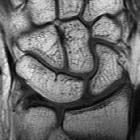triquetral bone

Dorsal
intercalated segment instability • Dorsal and volar intercalated segmental instability and normal carpal bone anatomy (illustrations) - Ganzer Fall bei Radiopaedia

Triquetrum
• Triquetrum (Gray's illustration) - Ganzer Fall bei Radiopaedia
The triquetrum (also known as os triquetrum or - historically - as the triangular bone) is one of the carpal bones and forms part of the proximal carpal row.
Gross anatomy
Osteology
The triquetrum is wedge-shaped carpal bone located between the lunate and the pisiform. It has an oval facet for articulation with the pisiform.
Articulations
- along with the scaphoid and lunate, forms the distal articular surface of the radiocarpal joint
- intercarpal articulations
- a meniscus attached to the triquetrum is located between the radiocarpal and pisiform-triquetral compartments
Attachments
Musculotendinous
- nil
Ligamentous
- lunotriquetral ligament
- triangular fibrocartilage complex (TFCC) components
- ulnotriquetral ligaments
- ulnar collateral ligament
- meniscal homologue
Blood supply
- receives its blood supply from a network of nutrient vessels on both non-articular surfaces
Variant anatomy
- lunotriquetral coalition
- a triquetrum shorter in its proximal-distal dimension than the adjacent lunate, mimicking a step-off
- accessory ossicles
- os triquetrum
- os triquetrum secundarium
- os triangulare
Radiographic features
Plain radiograph
- frontal projection (neutral wrist position)
- forms part of the carpal arcs
- Norgaard view
- better for evaluating the triquetral-pisiform articulation than the frontal or lateral view
Development
Ossification
Cartilaginous at birth, triquetral ossification typically begins at age three and is complete by age six or seven . The triquetral ossification center often precedes the lunate .
History and etymology
From the Latin "triquetrus" meaning "having three corners". It was originally termed the "cuneiform" bone, when named by Lyser in 1653. It was first called the "triquetrum" by Albinus in 1726.
Related pathology
Siehe auch:

 Assoziationen und Differentialdiagnosen zu Os triquetrum:
Assoziationen und Differentialdiagnosen zu Os triquetrum:

